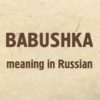Что такое “не везет”…
What is "no luck" and how to fight it
Today I share with you two cool and funny expressions from my youth that are still in use. Join me for this new episode of Very Much Russian podcast and boost your Russian to a completely new level! 🙂
Приве́т, друзья́.
Hello friends,
В студе́нческие го́ды была́ у меня́ подру́га, прие́хавшая в Пи́тер из далёкого го́рода. По́мню, что мне бы́ло кра́йне интере́сно слы́шать от неё выраже́ния, кото́рые в моём окруже́нии никогда́ не употребля́лись. Наприме́р, когда́ в ко́мнате в общежи́тии в очередно́й раз перегора́ла ла́мпочка, она́ люби́ла повторя́ть: что тако́е не везёт и как с ним боро́ться.
When I was a student, I had a friend who had come to St.-Petersburg from a remote city. I remember being very curious to hear from her the expressions that were never used in my environment. For example, when a bulb in the student hostel room had burned out again and again, she used to repeat: “that is ‘no luck’ and how to fight it”.
Э́та фра́за пришла́ мне на ум на днях во вре́мя просмо́тра како́го-го заба́вного ви́део и я попыта́лась найти́ её исто́чники. Как ни стра́нно, набра́в в Гугле “отку́да пошло́ что тако́е не везёт и как с ним боро́ться” мне удало́сь найти́ то́лько: две кни́ги с таки́м назва́нием, вы́пущенные гора́здо по́зже мои́х студе́нческих лет, а та́кже ма́ссу стате́й, кото́рые соде́ржат фра́зу в заголо́вке, но ничего́ не говоря́т о её происхожде́нии. Ни одного́ исто́чника. А ведь фра́за, по всей ви́димости, популя́рна и звучи́т заба́вно. 🙂
This phrase came to my mind the other day, while I was looking at a funny video, and I tried to find its source. To my surprise, having typed in Google “that is ‘no luck’ and how to fight it” I have found only two books with such names, as well as a lot of articles including it in their titles but saying nothing about the phrase origins. Not a single source. At the same time phrase, as it seems, is popular and sounds funny. 🙂
Кста́ти, очеви́дно, что в хо́ду два вариа́нта э́той фра́зы, различа́ющиеся концо́вкой: как с ним боро́ться и как с э́тим боро́ться. Пе́рвый вариа́нт придаёт “не везёт” отте́нок одушевлённости и звучи́т прико́льнее, как мне ка́жется.
By the way, it looks like that there are two variants of this phrase that differ in the ending: “how to fight him” and “how to fight it”. The first option gives to “no luck” a shade of animacy and sounds cooler, I think.
Ещё моя́ подру́га, зави́дев что́-то, что ей о́чень нра́вилось, называ́ла э́то изюми́тельным, как бы сочета́я два сло́ва – “изуми́тельный” и “изю́м”. В ру́сском языке́ изю́минка (одна́ я́годка изю́ма) зна́чит что́-то интере́сное и сто́ящее внима́ния. Наприме́р:
Also, my friend, having noticed something that she very much liked, called it “изюмительным”, as if combining two words – “amazing” and “raisin”. In Russian, the “raisin-инка” (one berry of raisin) means something interesting and worth attention. For example:
Есть в э́том кака́я-то изю́минка.
There is something in it.
Т.е. есть в э́том что́-то интере́сное.
Meaning there is something interesting in it.
Су́дя по всему́, сло́во изюми́тельный вы́шло из анекдо́та. Но, так как он не совсе́м прили́чный, в подка́ст включа́ть я его́ не бу́ду. Жела́ющие мо́гут прочита́ть его́ по ссы́лке. Несмотря́ на происхожде́ние, само́ сло́во изюми́тельный, хоть и не включено́ ни в оди́н слова́рь, дово́льно прили́чное. Так что мо́жете употребля́ть его́ без опа́ски показа́ться невоспи́танным.
To all appearances, what the word “изюмительный” came out of an anecdote. Although, since this is not a decent anecdote, I will not include it in the podcast. Those who wish can read it by the reference. In spite of its origin, the word “изюмительный”, although not included in any dictionary, it is pretty decent. So you can use it without fear of looking uneducated.
А я на э́том зака́нчиваю сего́дняшний вы́пуск, в кото́ром я э́кстренно подели́лась с ва́ми выраже́ниями из мое́й ю́ности. Уверя́ю вас, они́ ещё актуа́льны. По́льзуйтесь с удово́льствием и до ско́рой встре́чи!
And on this I am finishing today’s episode, in which I urgently shared with you the expressions from my youth. I assure you, they are still relevant. Use them with joy and see you soon!
Subscribe to our basic newsletter and receive notifications about new episodes of Very Much Russian podcast.
Or subscribe to our premium newsletter to receive both the basic newsletter and all our previous podcast episodes, one by one, on a regular basis.
Today's vocabulary
-
что такое не везет и как с ним бороться
Funny Russian expressions[chto ta-KO-ye nye vee-ZYOT ee kak s neem ba-RO-tsa]what is "not lucky" and how to fight it -
изюмительный
Funny Russian expressions[ee-zyu-MEE-teel'-nyî]amazing, interesting

















4 comments on “Что такое “не везет”…”
Choi Jungho says:
It is very helpful !!!
Очень по-русски says:
Thanks for the feedback. 🙂
Conny says:
I love your content. However, in this case I didn’t understand in which situations you use this phrase and what it actually means. Maybe you can explain this once more. Thanks.
Очень по-русски says:
Hello Conny,
Thanks for the question.
To explain you differently what it means, I’ll give you this example: you have probably seen “help yourself” type of books with titles “How to gain self-confidence” or something like that. This phrase sounds like a title of such a book “What is bad luck and how to fight it”. Literally it means exactly what you hear.
You can use this phrase jokingly when something does not go as you expect, like stating the fact that what’s happening is a bad luck.
For example, if you accidentally spilled something, instead of regular “Damn!” you can say this phrase. It’s sounds lighter and helps you to stay in more positive mood than if you used swears.
I hope this explanation helps. Have a nice day!